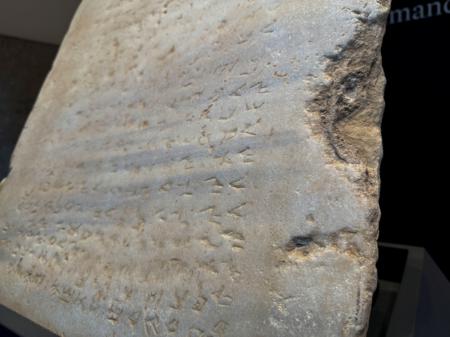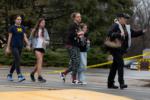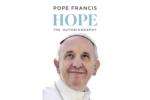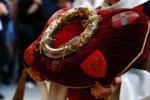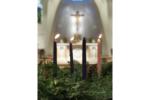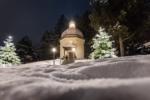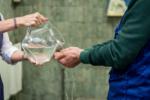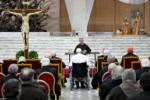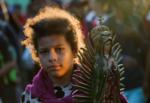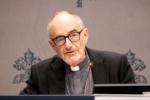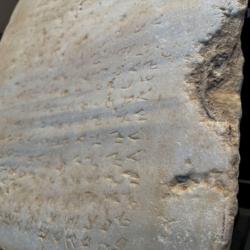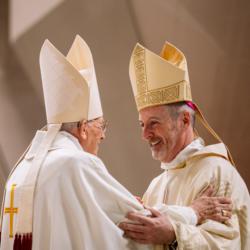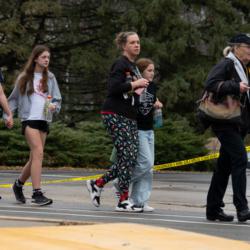Top DDF official says truth in abuse cases is 'critical' as Father Rupnik investigation continues
(OSV News) -- Transparency and truth are of "critical importance" in the work of the Pontifical Commission for the Protection of Minors (PCPM) and the Dicastery for the Doctrine of the Faith (DDF), the Secretary of the Disciplinary Section at the Vatican Dicastery has said.
Irish Archbishop John Kennedy told OSV News that the two departments "have ultimately the same goal: to change the culture and life of the Church so that it is a safe place for children" and to "find out the truth about allegations of abuse and serve justice."
The Vatican official was responding to a question about the PCPM's first annual report assessing the church's policies and procedures to prevent abuse in dioceses worldwide, which was published Oct. 29. The 50-page report identified a "persistent concern regarding the transparency in the Roman Curia's procedures and juridical processes" and cited the DDF in particular for its slow processing of cases and lengthy canonical proceedings.
Recognizing that cases can sometimes be lengthy, the Irish prelate said this was because the canonical proceedings may not usually begin until the civil courts have completed their judgment.
"While a bishop may receive notification about an alleged abuse, he is obliged to first follow the laws of the land and not interfere in a civil legal process until everything has been concluded. When the case then is free to enter into the canonical realm, things usually move along but there can be other factors that can cause delays. Some victims can be hesitant about giving evidence because of the belief that these details might become public. We cannot stress enough that these matters are treated with the utmost confidentiality."
Archbishop Kennedy, 56, said the dicastery strives to help in every way and regularly asks for an update, usually every six months.
"We are aware that recounting what took place can be traumatic for victims in some cases and so we are sensitive to finding a balance between the victim's right to be heard and the need to obtain evidence that will enable the canonical proceedings to come to a just determination," he said.
Noting that the commission strives to prevent abuse, protect and educate, while the dicastery has the task of examining and judging cases when they occur, Archbishop Kennedy said each entity has a role to play. "Steps are needed, of course, as a priority to prevent abuse happening," he said, "and, when it does (happen), other procedures are in place to address the situation. In an ideal world, every case would be resolved in a very short period of time."
Archbishop Kennedy, who was ordained bishop by Cardinal Victor Manuel Fernández, prefect of the DDF, on Sept. 28 in St. Peter's Basilica, becoming titular archbishop of Ossero, acknowledged the importance of transparency and truth. It was for this reason, he said, that the norms that govern the DDF's processes are public and available on the internet.
According to Archbishop Kennedy, the DDF and the PCPM are "actively looking for ways in which clarity can be given and more information can be shared in an appropriate and helpful way with those who bring forward allegations under the competence of this dicastery."
Recognizing "the contribution by so many at every level in confronting abuse," he said "prevention and justice are a combined task in the work of the whole church," and strengthening "our unity and resolve, we can continue to make important steps together."
Archbishop Kennedy, who was ordained a priest in Ireland in 1993, "just as the abuse crisis was taking hold," he said, related how one parish priest he served with in the Archdiocese of Dublin told him that "at one point in 1995 he was afraid to go outside the parish boundaries dressed as a cleric for fear of the reaction he might receive." Archbishop Kennedy recalled: "I tried to encourage him by saying that those who were not abusers had nothing to fear and that we needed also to be signs of hope."
"My Irish experience has taught me that the suffering of just one victim is already too much, and that any kind of abuse, whether it be sexual, verbal, emotional or otherwise, has no place in the church," he said.
In Archbishop Kennedy's opinion, the sexual abuse of minors creates a "lose-lose situation," causing "a web of tears, suffering, injustice and damage that often filters down into future generations."
There is spiritual suffering, too, he acknowledged, because a person's image and relationship with God can be wounded, sometimes beyond repair, because of the way he or she was treated by a member of the clergy.
"Since the church is the Body of Christ, even those who were not abused directly share in the suffering, albeit in a lesser way," he said.
Of the staff at the discipline section of the DDF, Archbishop Kennedy told OSV News that although "most of us ... do not have a public profile, my colleagues and I strive daily to combat this suffering, to restore justice, reform the offender and repair scandal. This is the mission that has been entrusted to us, and we are dedicated to it each day."
He admitted that no matter what course of action they take, they cannot undo the harm or make the pain go away for the victims.
"We who work each day on these cases are baffled and appalled by the presence and manifestations of evil but will not be overcome by them," he said. "As God gives us strength, we will continue to do all (we) can to eradicate this scourge using the legal instruments that we have been given."
Since the church is one family, he said, he is confident that, in God's own mysterious ways, "the good that we try to achieve will, in time, bring about fruits of peace and healing," the Irish archbishop told OSV News.
The fact that cases continue to arrive in the dicastery for examination is "both a sad reflection that the church needs to continue its efforts in the area of prevention and justice, but it also indicates that the church is being trusted to examine these matters," he said.
Asked about the case proceeded by the DDF on a former Jesuit, a Slovenian priest-artist Father Marko Rupnik, Archbishop Kennedy said it is "still progressing" and therefore he could not comment, adding that, for him, "by speaking about one case and not about another, just because the name of the accused may be widely known, demonstrates little sensitivity to other cases and could overshadow the suffering of other victims who do not have louder voices to call attention to their situation."
The investigation into Father Rupnik continues after Pope Francis waived the statute of limitations Oct. 27, 2023. Father Rupnik's grave abuse allegations by former sisters of the Loyola Community emerged to the public two years ago, on Dec. 18, 2022.
"For me, one case of abuse is already one too many, and every case, in my view, is urgent," Archbishop Kennedy told OSV News.
- - - Sarah Mac Donald writes for OSV News from Dublin.- - - NOTES:
